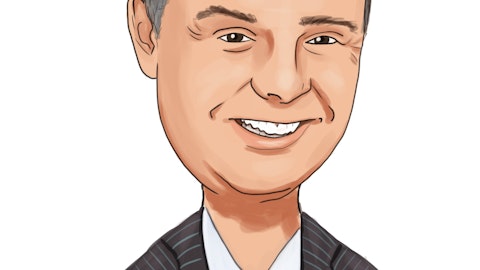Alberto Paracchini: Yes. So two questions there. So on the conversion, yes, by the time we have this call next quarter, we will be fully converted. So that’s on schedule and progressing along nicely. And in terms of the accretion, Terry, we’re finalizing marks, I think the biggest driver of the mark like it was when we announced. And obviously, you could look at the rate movements. But the interest rate marks are going to add – are obviously significant and we’ll add probably, I would say, at this point, probably a bit more accretion. But we’ll be better prepared to cover that in detail at our next call, next quarter.
Terry McEvoy: And then just one last question. I read a couple of days ago about this proposal to triple the transfer tax of real estate in Chicago. I don’t know if that’s residential as well as multifamily. But is there anything there? Are there any risk to the real estate market in Chicago and Byline in particular?
Alberto Paracchini: I think it’s probably too early to judge any type of impact. I mean, I think over the years, there’s been – any time that there’s a change. And we’ve been wrong, Terry, so many times, like there’s been a new proposed change, and we think it’s going to have X or Y positive or negative impact on the market. We think that maybe transactions are going to slow down, that prices are going to be impacted. And I think what we’ve learned is like we have – we’re more often very wrong when we try to guess what the ultimate outcome is going to be. So I guess, put it differently, the market is pretty resilient. Our sense is, our best guess is the market will adjust accordingly. There’s usually kind of like a reset period, and then you proceed along from there. So too early to judge on that at this point, Terry.
Terry McEvoy: Again, thanks for taking my questions. And I hope you have a nice weekend.
Alberto Paracchini: Great. Thank you. Likewise.
Operator: Thank you, Terry. Your fourth question comes from the line of Brian Martin from Janney Montgomery Scott. Brian, your line is now open.
Brian Martin: Hi. Good morning, everyone. Just one follow-up. Tom, just on the fee income component from Inland, remind me how big that piece was just as we kind of size up things looking forward?
Thomas Bell: Specifically for Inland fee income? Is that what you are asking?
Brian Martin: Yes. What are we adding – yes, just kind of adding on an annual basis with the acquisition? I know there was some noise in there with the mortgage unit going away. So just trying to understand how to think about that, along with kind of your standalone operation.
Thomas Bell: Terry, I’m going to have to get back to you on that, sorry.
Alberto Paracchini: Just don’t have that in front of us.
Thomas Bell: I don’t have it out of me right now.
Brian Martin: And then I guess just, I think the commentary on the fee income outside of the fair value mark standalone for Byline, that’s been pretty stable here in the last couple of quarters. Any areas you guys are focused on as far as driving growth there prospectively that I guess we should be thinking about?
Thomas Bell: Related to fee income?
Brian Martin: Yes. Just kind of a standalone Byline unit. I mean it looks like the last two or three quarters have been pretty consistent when you strip out that mark.
Thomas Bell: Yes. I think on the fee income side, I think we’re continuing to improve our treasury management opportunities. We do back-to-back customer swaps. Those are starting to pick up a little bit as well. And then our wealth management business is growing, so that’s helping, too.
Brian Martin: And kind of like the pipeline and the government guaranteed expectations next quarter seem pretty consistent with this quarter in terms of premiums and production?
Thomas Bell: Correct.


